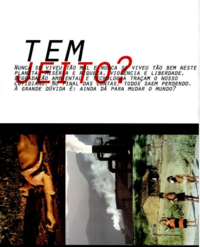Guerra cultural e visualidade: Uma análise da retórica das redes sociais na crise brasileira entre 2013 e 2018
Na última década, o Brasil viveu uma crise democrática, num contexto de ascensão da extrema-direita em todo o mundo. Esse processo se deu com o protagonismo da internet e das redes sociais, palcos de disputas ideológicas que influenciaram eleições e a história política de diversos países. O ativismo político online passa por uma guerra nos campos da visualidade e das retóricas visuais, onde se disputa a atenção dos usuários e se desafia o design das redes em busca de audiência e engajamento. Os protestos de rua de junho de 2013 são vistos por muitos como o estopim da crise democrática brasileira, num processo de retirada do governo petista de centro-esquerda, culminando numa ascensão da extrema-direita, com a eleição de Jair Bolsonaro em 2018. Esse é um recorte da história política do Brasil com influência direta da guerra de visualidade nas redes. A presente dissertação busca investigar dois fenômenos que demarcam esse período como forma de observar a transição de um sistema para o outro. Ao nos debruçarmos sobre a Mídia NINJA – coletivo de comunicação independente que surgiu no fervor dos protestos de Junho de 2013 – e sobre youtubers bolsonaristas, influenciadores digitais de extrema-direita importantes para a eleição de Jair Bolsonaro em 2018 – podemos observar a centralidade que os aspectos visuais da internet assumem numa disputa de narrativas que sai da web e ganha as ruas e as urnas. Foram realizadas análises de retórica visual, assim como análises de retórica da interação das principais redes sociais utilizadas por cada grupo. Além disso, foram realizadas contextualizações sobre a relação entre política e internet no Brasil e sobre a guerra de visualidade no contexto da internet.
In the last decade, Brazil has experienced a democratic crisis in the context of the rise of the far right around the world. This process has been fuelled by the internet and social networks, the stage for ideological disputes that have influenced elections and the political history of several countries. Online political activism is going through a war in the fields of visuality and visual rhetoric, where users' attention is being fought for and the design of networks is being challenged in search of an audience and engagement. The street protests of June 2013 are seen by many as the trigger for Brazil's democratic crisis, in a process of removal of the centre-left PT government, culminating in the rise of the far right, with the election of Jair Bolsonaro in 2018. This is a cross-section of Brazil's political history directly influenced by the war of visuality on the networks. This dissertation seeks to investigate two phenomena that mark this period as a way of observing the transition from one system to another. By looking at Mídia NINJA - an independent communication collective that emerged in the fervour of the June 2013 protests - and Bolsonaro's YouTubers - far-right digital influencers who were important to the election of Jair Bolsonaro in 2018 - we can observe the centrality that the visual aspects of the internet assume in a dispute of narratives that leaves the web and takes to the streets and the ballot box. Analyses of visual rhetoric were carried out, as well as analyses of the rhetoric of interaction on the main social networks used by each group. In addition, contextualisations were made on the relationship between politics and the internet in Brazil and on the war of visuality in the context of the internet.
